
Friedrich August von Hayek, often referred to by his initials F. A. Hayek, was an Austrian-British academic who contributed to economics, political philosophy, psychology, and intellectual history. Hayek shared the 1974 Nobel Memorial Prize in Economic Sciences with Gunnar Myrdal for work on money and economic fluctuations, and the interdependence of economic, social and institutional phenomena. His account of how prices communicate information is widely regarded as an important contribution to economics that led to him receiving the prize.
The philosophy of education is the branch of applied philosophy that investigates the nature of education as well as its aims and problems. It also examines the concepts and presuppositions of education theories. It is an interdisciplinary field that draws inspiration from various disciplines both within and outside philosophy, like ethics, political philosophy, psychology, and sociology. Many of its theories focus specifically on education in schools but it also encompasses other forms of education. Its theories are often divided into descriptive theories, which provide a value-neutral description of what education is, and normative theories, which investigate how education should be practiced.
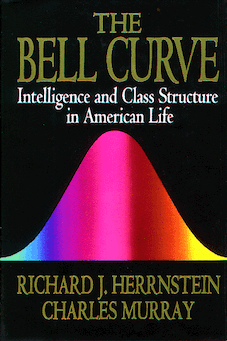
The Bell Curve: Intelligence and Class Structure in American Life is a 1994 book by the psychologist Richard J. Herrnstein and the political scientist Charles Murray in which the authors argue that human intelligence is substantially influenced by both inherited and environmental factors and that it is a better predictor of many personal outcomes, including financial income, job performance, birth out of wedlock, and involvement in crime than are an individual's parental socioeconomic status. They also argue that those with high intelligence, the "cognitive elite", are becoming separated from those of average and below-average intelligence, and that this separation is a source of social division within the United States.

Thomas Sowell is an American economist, social philosopher, and political commentator. He is a senior fellow at the Hoover Institution. With widely published commentary and books—and as a guest on TV and radio—he is a well-known voice in the American conservative movement as a prominent black conservative. He was a recipient of the National Humanities Medal from President George W. Bush in 2002.
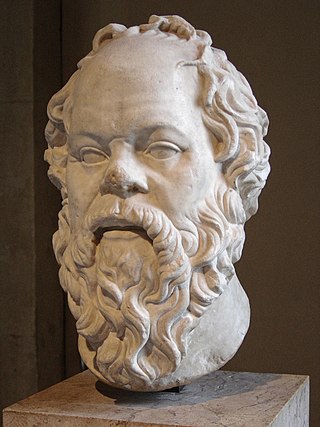
An intellectual is a person who engages in critical thinking, research, and reflection about the reality of society, and who proposes solutions for its normative problems. Coming from the world of culture, either as a creator or as a mediator, the intellectual participates in politics, either to defend a concrete proposition or to denounce an injustice, usually by either rejecting, producing or extending an ideology, and by defending a system of values.
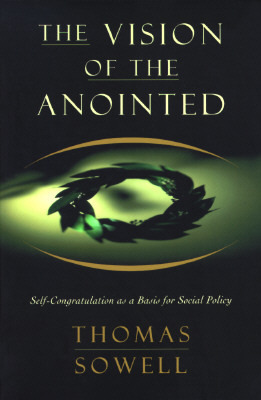
The Vision of the Anointed (1995) is a book by economist and political columnist Thomas Sowell which brands people and organizations that he calls "the anointed" as "promoters of a worldview concocted out of fantasy impervious to any real-world considerations". Sowell asserts that these thinkers, writers, and activists continue to be revered even in the face of evidence disproving their positions.
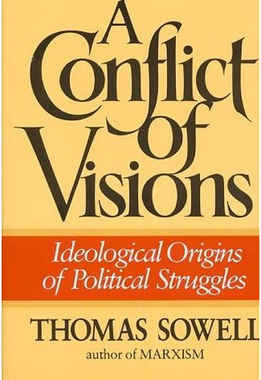
A Conflict of Visions is a book by Thomas Sowell. It was originally published in 1987; a revised edition appeared in 2007. Sowell's opening chapter attempts to answer the question of why the same people tend to be political adversaries in issue after issue, when the issues vary enormously in subject matter and sometimes hardly seem connected to one another. The root of these conflicts, Sowell claims, are the "visions", or the intuitive feelings that people have about human nature; different visions imply radically different consequences for how they think about everything from war to justice.
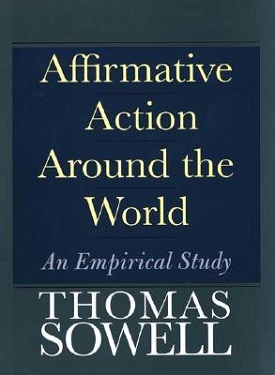
Affirmative Action Around the World: An Empirical Study is a 2004 nonfiction work by economist Thomas Sowell.
Reserve army of labour is a concept in Karl Marx's critique of political economy. It refers to the unemployed and underemployed in capitalist society. It is synonymous with "industrial reserve army" or "relative surplus population", except that the unemployed can be defined as those actually looking for work and that the relative surplus population also includes people unable to work. The use of the word "army" refers to the workers being conscripted and regimented in the workplace in a hierarchy under the command or authority of the owners of capital.

Criticism of Marxism has come from various political ideologies, campaigns and academic disciplines. This includes general intellectual criticism about dogmatism, a lack of internal consistency, criticism related to materialism, arguments that Marxism is a type of historical determinism or that it necessitates a suppression of individual rights, issues with the implementation of communism and economic issues such as the distortion or absence of price signals and reduced incentives. In addition, empirical and epistemological problems are frequently identified.
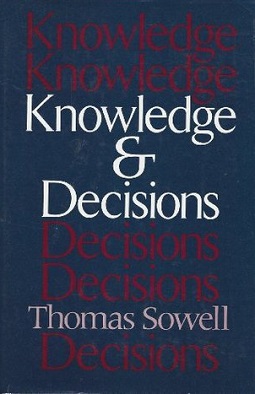
Knowledge and Decisions is a non-fiction book by American economist Thomas Sowell. The book was initially published in 1980 by Basic Books and reissued in 1996. Sowell analyzes social and economic knowledge and how it is transmitted through society, and how that transmission affects decision making. The book's central theme of dispersed knowledge is drawn from F.A. Hayek's article "The Use of Knowledge in Society." Hayek said that this book expanded admirably on his original concepts and made them clear to lay readers, with examples of economic activity drawn from the real world.

Anti-intellectualism is hostility to and mistrust of intellect, intellectuals, and intellectualism, commonly expressed as deprecation of education and philosophy and the dismissal of art, literature, history, and science as impractical, politically motivated, and even contemptible human pursuits. Anti-intellectuals may present themselves and be perceived as champions of common folk—populists against political and academic elitism—and tend to see educated people as a status class that dominates political discourse and higher education while being detached from the concerns of ordinary people.

Criticism of science addresses problems within science in order to improve science as a whole and its role in society. Criticisms come from philosophy, from social movements like feminism, and from within science itself.
In economics, a government-granted monopoly is a form of coercive monopoly by which a government grants exclusive privilege to a private individual or firm to be the sole provider of a good or service; potential competitors are excluded from the market by law, regulation, or other mechanisms of government enforcement. As a form of coercive monopoly, government-granted monopoly is contrasted with an unregulated monopoly, wherein there is no competition but it is not forcibly excluded.
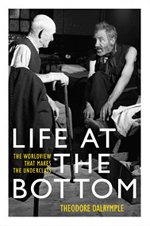
Life at the Bottom: The Worldview That Makes the Underclass is a collection of essays written by British writer, doctor and psychiatrist Theodore Dalrymple and published in book form by Ivan R. Dee in 2001. In 1994, the Manhattan Institute started publishing the contents of these essays in the City Journal magazine. They are about personal responsibility, the mentality of society as a whole and the troubles of the underclass. Dalrymple had problems in finding a British publisher to help him turn his individual essays into a collection, so he eventually turned to American companies for publication.

Barclays Bank plc v O’Brien[1993] UKHL 6 is an English contract law case relating to undue influence. It set out the basic categories of undue influence as,

An Introduction to Animals and Political Theory is a 2010 textbook by the British political theorist Alasdair Cochrane. It is the first book in the publisher Palgrave Macmillan's Animal Ethics Series, edited by Andrew Linzey and Priscilla Cohn. Cochrane's book examines five schools of political theory—utilitarianism, liberalism, communitarianism, Marxism and feminism—and their respective relationships with questions concerning animal rights and the political status of (non-human) animals. Cochrane concludes that each tradition has something to offer to these issues, but ultimately presents his own account of interest-based animal rights as preferable to any. His account, though drawing from all examined traditions, builds primarily upon liberalism and utilitarianism.

Inside American Education: The Decline, The Deception, The Dogmas is a book by economist and social theorist Thomas Sowell that details Sowell's assessment of the state of education in the United States.

Wealth, Poverty and Politics: An International Perspective is a book by American economist and social theorist Thomas Sowell. It was originally published by Basic Books in 2015, with an updated version published in 2016. In the work, Sowell argues against the notion that economic equality is solely natural, and examines geographic, cultural, social, and political factors that have contributed to the wealth of groups and nations.

Charter Schools and Their Enemies is a 2020 book by American economist, social theorist and author Thomas Sowell, in which he compares the educational outcomes of school children educated at charter schools with those at conventional public schools. He argues that charter schools on the whole do significantly better in terms of educational outcomes than conventional schools.


















